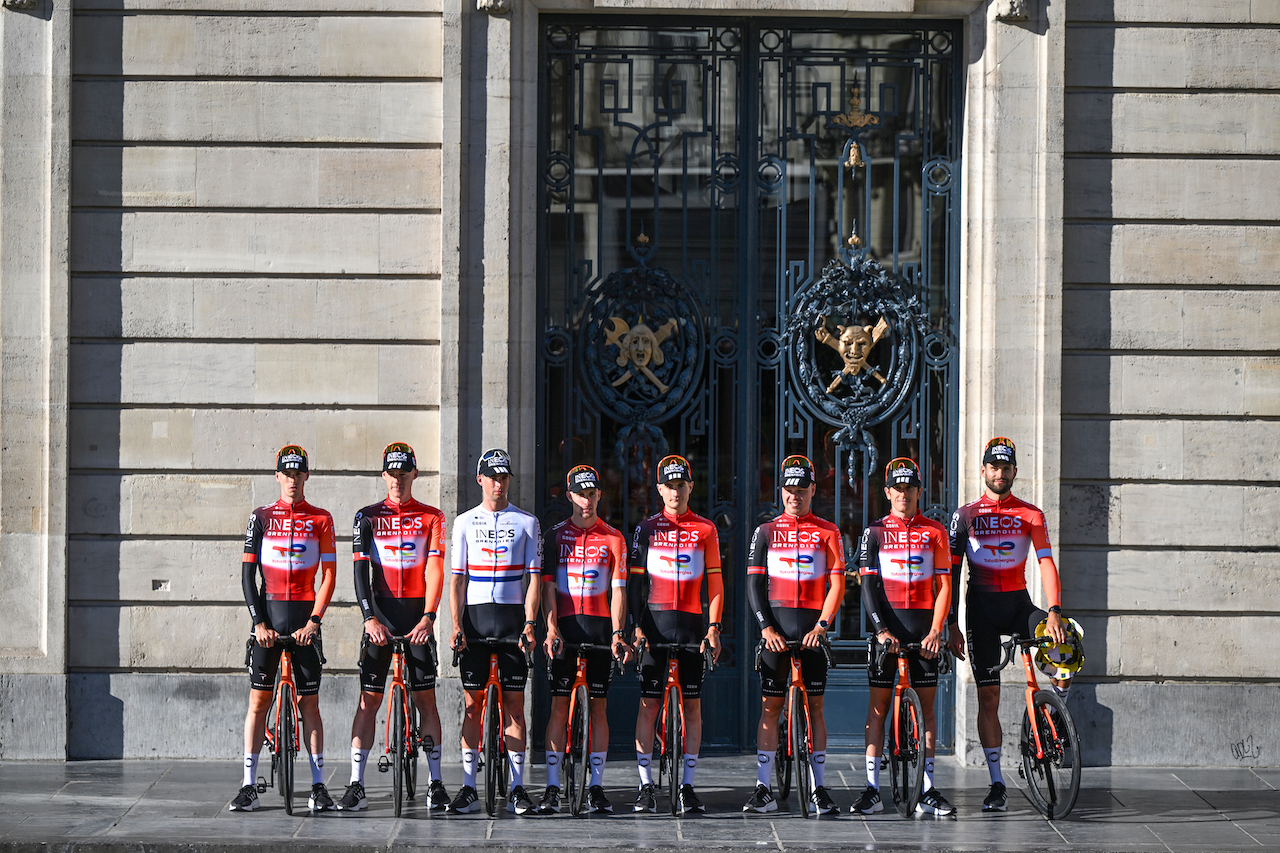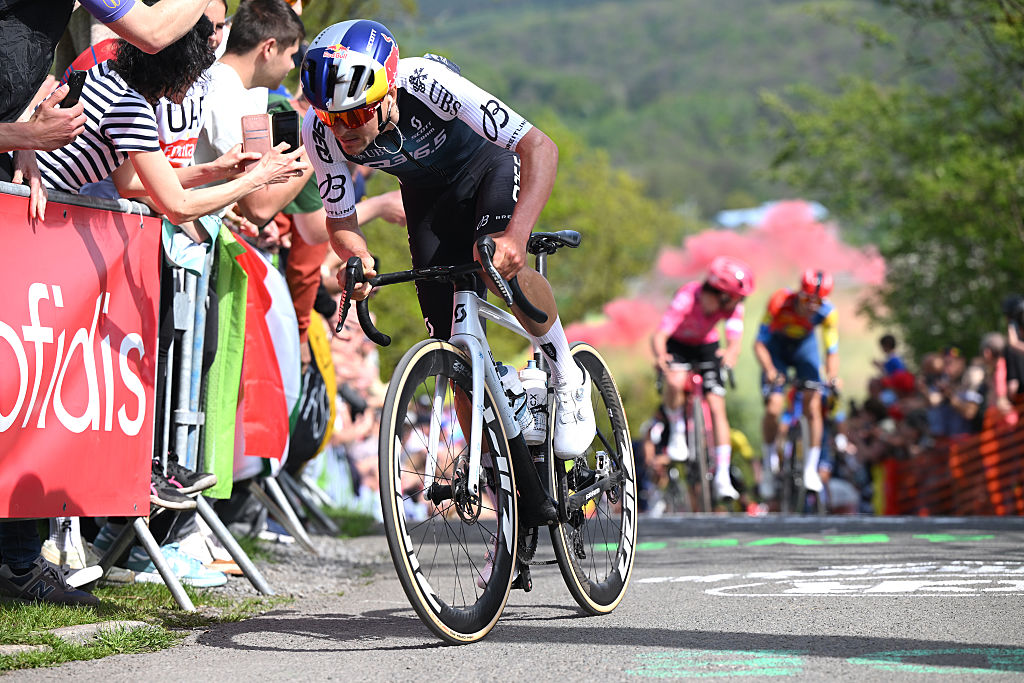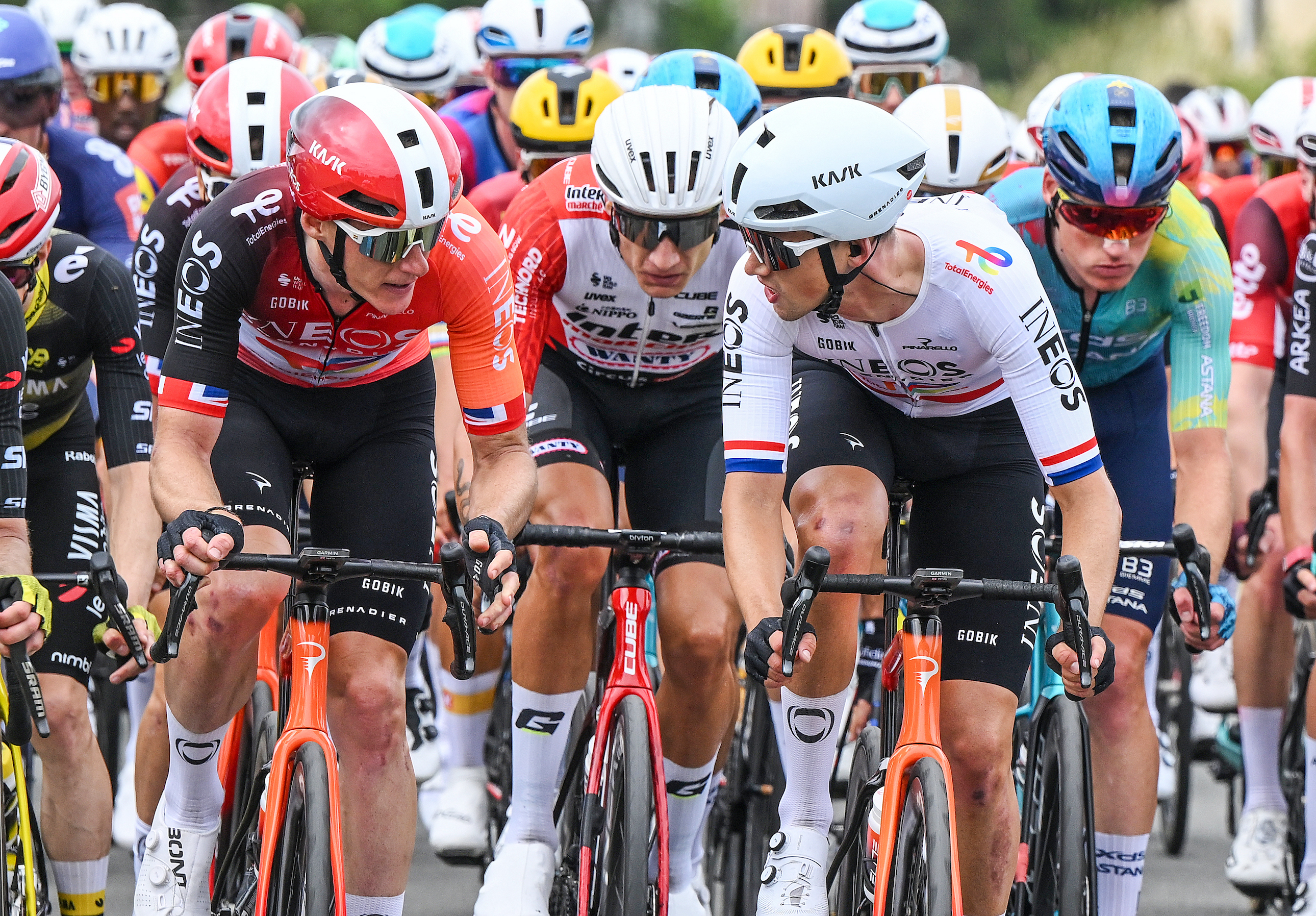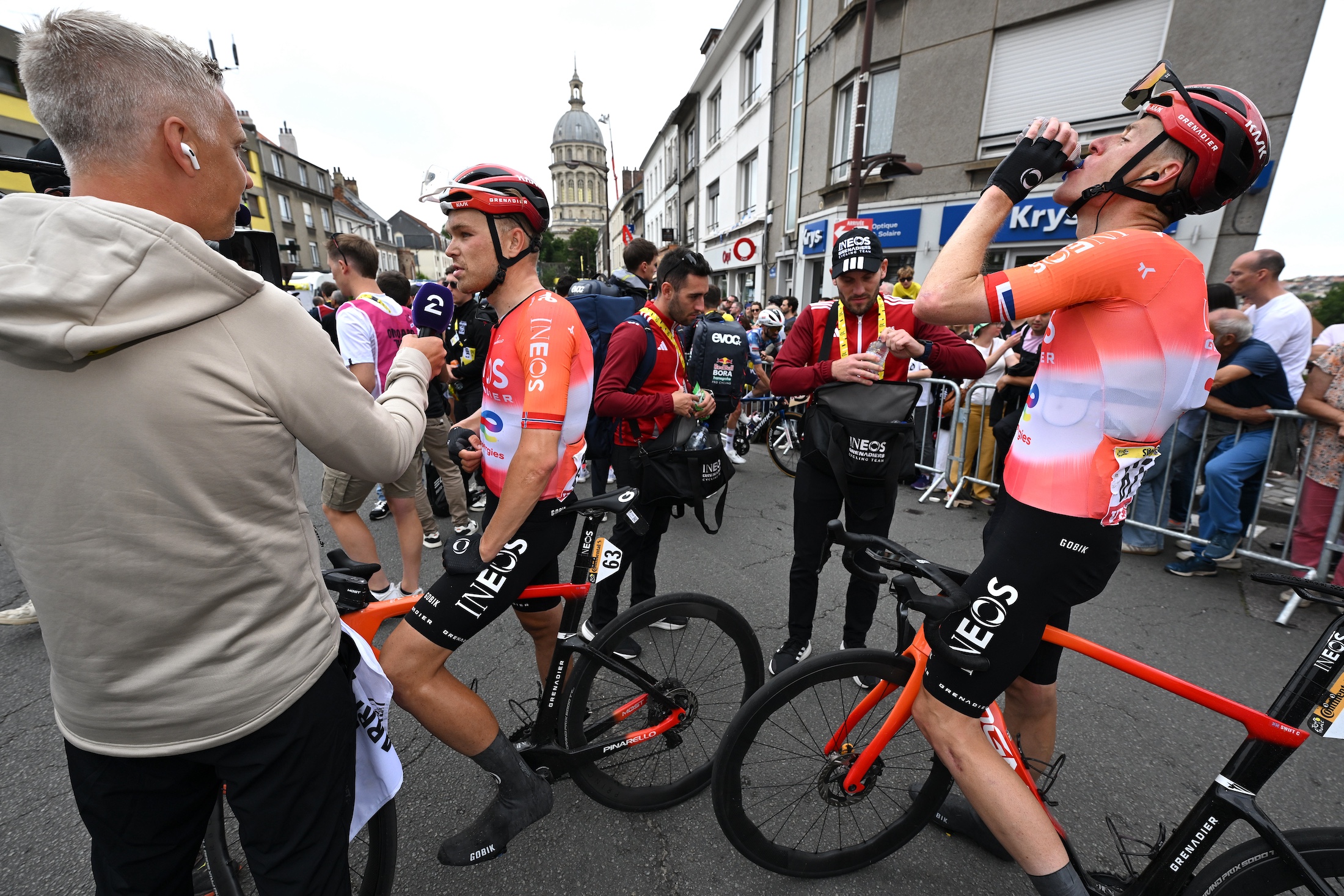
This feature originally appeared in the print edition of Cycling Weekly, on sale in newsagents and supermarkets, priced £3.35. You can subscribe through this link here.
Another year, same recurring question. Only this time it feels urgent to the point of being potentially fatal: can Ineos Grenadiers, in a more delicate position than ever before in their 16-year history, survive another bad showing at the Tour de France?
The story is by now familiar to everyone: across eight years, Ineos Grenadiers – previously Team Sky – won seven yellow jerseys with four different riders, taking 15 stages along the way. Their Grand Tour dominance was cemented further with overall victories at the Vuelta a España and the Giro d’Italia. Yet, while they’ve twice finished third in the following five editions of the Tour, they haven’t seriously challenged for the top spot since Egan Bernal’s win in 2019. There is no shame in that, you might argue, given that no one aside from Primož Roglič (in 2020) has given Tadej Pogačar and Jonas Vingegaard a serious run for their money over that period – and that only Remco Evenepoel, if anyone, looks capable of doing so in forthcoming years. But Ineos are not just any team.
Britain’s only WorldTour outfit are the second richest cycling team in the world, bankrolled to the tune of more than €50m by one of Britain’s richest men, Jim Ratcliffe, and their core objective is to win Grand Tours – principally the Tour de France. Slight problem, then, when the only other three-week races they’ve won this decade were the 2020 and 2021 Giro d’Italia. That’s a four-year barren spell, with no glory from 12 Grand Tours.
The team’s main GC rider for almost a decade, Geraint Thomas, is retiring at the end of the season; their brightest young hope Carlos Rodríguez is currently off the pace – at the time of writing, he is already 1.20 astray after just two stages; and after pursuing Evenepoel for several years, he now appears destined for Red Bull-Bora-Hansgrohe.
This year's race got off to a bad start when the team’s main prospect for TT stage wins, Filippo Ganna, crashed heavily and subsequently abandoned. Previously they’d have looked to Tom Pidcock for a stage win, but he left in a rage last winter.
Yes, Ineos have raced more positively, aggressively and entertainingly this season – just as they promised they would – and they’ve already passed last season’s paltry win tally of 14 (albeit eight of their 19 victories in 2025 have been national championship titles) but the stark reality is they’ve no one capable of winning a Grand Tour any time soon. In the past, Ineos were willing to solve problems with money, but Ratcliffe has closed off the possibility of opening the cash taps any wider.
Total Energies was unveiled as a secondary sponsor just before the Tour, with a new jersey drawing social media scorn for its apparently hasty logo integration. Also announced shortly before the start was the return of Dave Brailsford into team management. The longer the team go without Grand Tour wins, the bleaker their outlook appears to be, even with Brailsford – the man who engineered so much success – back in the hotseat. Can Britain’s super-squad afford to plod through another lap of France? And what effect might that have on both their own long-term future and that of British cycling?
“I like to think that from 2010 we’ve earned the right to be called a super-team, [but] it’s a super-team that needs to win more,” the team’s CEO John Allert admitted on the eve of the race.

Trouble behind the scenes
It’s not just that Ineos have failed to match the dominance of UAE Team Emirates-XRG and Visma-Lease a Bike in recent years; behind-the-scenes unrest has also painted the picture of a team, if not in meltdown, then certainly struggling to maintain cohesion. Issues with management have been the principal bugbear. Former chief Brailsford began moving away from cycling in 2021 to focus on Ineos’s wider sporting interests – namely Manchester United.
His longtime ally Rod Ellingworth took over, but not for long, departing after two seasons. Sources told CW that Ellingworth became frustrated by the many layers of approval required to make decisions – including from Ratcliffe himself, who insists on having the final say on all transfers. One source complained that “Ineos men sleep too much,” referring to the constant delays. Ellingworth was replaced by Australian John Allert, with Scott Drawer returning as performance manager. Geraint Thomas, in his characteristically candid style, described the set-up as a “coalition government” during last year’s Tour – hinting at strained internal politics.
Through multiple reports, leaks and rumours, a pattern has emerged of riders growing unhappy with the apparently inflexible, restrictive nature of the Ineos regime. Tom Pidcock, who has seemed reenergised since his move to Q365, said earlier this year that “things were just not going how it was originally envisaged at Ineos, how I imagined it.” He added: “I signed my contract with different people who run the team now and that did create some difficulties.” He has since added that he wasn’t happy at any point last season. Fellow Brit and one-time big race hope Ethan Hayter expressed similar sentiments when he moved to Soudal Quick-Step at the end of last season. “When you run a cycling team like a business, the riders and staff lose their passion,” he said. “That was the case at Ineos in recent years – racing felt more and more like a job.”
Recently, Ineos have begun to address the criticism. Brailsford will be with the team for at least some of year’s Tour as he prepares to return as full-time leader. “We want to win the Tour, but there’s no point just saying [that]. You’ve got to do something about it. That’s why it’s great to welcome Dave back into the fold,” said Zak Dempster, the team’s lead DS at the Tour. “Dave loves a performance challenge and this is the biggest... [He] and everyone at Ineos all want to win the Tour, but we’ve got to do more than we’re doing to get better than the people that are dominating at the moment.”
Thomas is also primed for a management position, which in Pidcock’s view at least, would be a huge step forward. “G says things how they are – he won’t beat around the bush,” the 25-year-old told CW recently. “That’s what they need: someone straight-talking – it’s what they miss at the top. It’s more the political stuff up above – people just need to be told things straight.”

The fight for extra funding
Under what guise the team will exist next season, however, is currently unknown. Ratcliffe has been pulling back from a number of his sporting investments recently, but it is understood that he remains committed to funding the cycling team – even if he rarely attends races or training camps. In the longer-term, though, he wants financial support, and it appears to be on the way.
The planned co-title-sponsor deal with TotalEnergies – the petrochemical company having multiple existing business links with Ineos – is still being worked through, though the new jersey suggests the financial contribution is already significant. Publicly at least, Ineos insist that they remain in the market for extra funds. “We’ve got all sorts of discussions going on, and we haven’t finished those discussions,” Allert said, hinting at more money becoming available to the team.
What the team would do with such a cash injection is clear: try to sign a latent GC superstar – though it is unclear who that would be, with Evenepoel out of the equation. For now, the search continues – and the wait has to go on.
What can they salvage?
In the here and now, what does success constitute for Ineos at this year’s Tour? A podium on GC, or several stage wins? “Like most teams, we exist for the Tour de France,” said Dempster. “It’s the biggest race of the year, and the feeling of winning a stage and the momentum through the race, that’s what we do it for. Winning stages is going to be really important, but I think we need to be realistic on GC, and brave and bold and move the race where we can, and hopefully take time in creative ways.” He seemed to be managing expectations. “It’s no secret that [head-to-head] there are guys who are stronger than us. That’s the reality, but at the same time, if we’re smart and bold, nothing is out of the question on GC.”
The team’s dreams of Tour GC success for Thomas, Rodríguez or Thymen Arensman are already fading, with Connor Swift and Axel Laurence the only other two with an outside chance of taking a stage win. “Carlos is our main man and we’ll see what he can do and how far he can hang in there,” Thomas said just as the race got underway. “The last couple of years have been more about [targeting] stages, but that’s exciting – we can go at it a bit more, but not go too crazy for the sake of it.”
Recently-crowned British champion Sam Watson was drafted into the team at the last minute, an unexpected late call-up which underlines the team’s lack of a guaranteed line-up; in their peak years, their eight-man squad could have been predicted months in advance, but that’s no longer the case for a team in a state of flux.
The importance of a successful Tour de France cannot be overstated for any team. CW has seen a leaked document from a rival WorldTour team that outlines just how much of an outsized role the Tour has on media exposure and sponsorship awareness. The independent report, commissioned by said team, highlights how the Tour receives over three times more media coverage than the Giro d’Italia, and over four times more than the Vuelta a España. Other races barely register interest.
Sponsors get 2.5 times more exposure from the Tour than the Giro and Vuelta, and exposure from the biggest one-day Monuments, Tour of Flanders and Paris-Roubaix, is minuscule by comparison. In other words: far more eyes are focused on the sport in July than at any other time, and failure to produce victories during the 21 stages can harm a team’s search for additional funding, as well as the obvious impact it has on how prospective riders view joining said team.

The longer-term outlook
The other question to ask about Ineos is how its demise affects British cycling. The domestic racing scene has been decimated in recent years, and Ineos are the only British men’s UCI-registered team. It’s difficult to give a definitive answer as to how important the team’s success and continued presence in the peloton are to the sport in the UK, but it is certain that the success of Team Sky inspired the likes of Pidcock, Hayter and new national champion Sam Watson.
Part of the team’s initial focus upon launch in 2010 was to act as a pathway for British talent, and over the course of their first decade around a third of riders were British. That number has sharply dropped to six in 2025 – the lowest ever – while the team has missed out on British talent like Matthew Brennan, Oscar Onley and Max Poole. “One of the core parts of the team’s original identity was that it would be a home for British riders, but that seems to have gone,” one source bemoaned.
It is not all doom and gloom, of course. Ineos still possess several big race winners, and in Ganna and Josh Tarling they have arguably two of the best time triallists in the world; possible future signing Evenepoel is the other one. What’s more, the team isn’t hiding behind their issues: they know they have to step up. “Where once we were at the top of the heap, we’re not anymore,” admitted Allert. “It’s not just about money – it’s also about competence, strategy, resources and hard work.” Brailsford, going by his track record, should address all four of those points. That’s the hope, anyway.
It’s worth adding too that the team has survived all the malpractice allegations of the late 2010s – their doctor Richard Freeman being struck off; the infamous jiffy bag accusations; and more – without their branding and appeal being significantly harmed, suggesting they can weather any storm. Even one as dark as this.
Thomas in a management role guiding a bright new GC protégé is an enticing prospect, but as things stand the British team remain a long way from their glory days. What, if anything, can they do to turn things around?
The Ineos drought in numbers
4: Riders from Team Sky/Ineos Grenadiers won the Tour de France from 2012 to 2019.
7: Tour stage wins by Chris Froome between 2012 and 2016 – the most of any rider from the team.
5: British Tour stage winners from Sky/Ineos.
0: Number of GC wins by Ineos from the 12 Grand Tours leading up to this year’s Tour.
5: Number of Tours de France, out of the previous 15, at which Sky/Ineos have not won a stage.
7 minutes: The time gap that both Richard Carapaz (third in 2021) and Geraint Thomas (third in 2022) were adrift from the winner.
3: GC victories from 28 ‘Big Seven’ one-week stage races since 2022.
6: British riders on the team in 2025 – the fewest ever.
€50m: Reported amount Jim Ratcliffe invests into Ineos Grenadiers annually.







